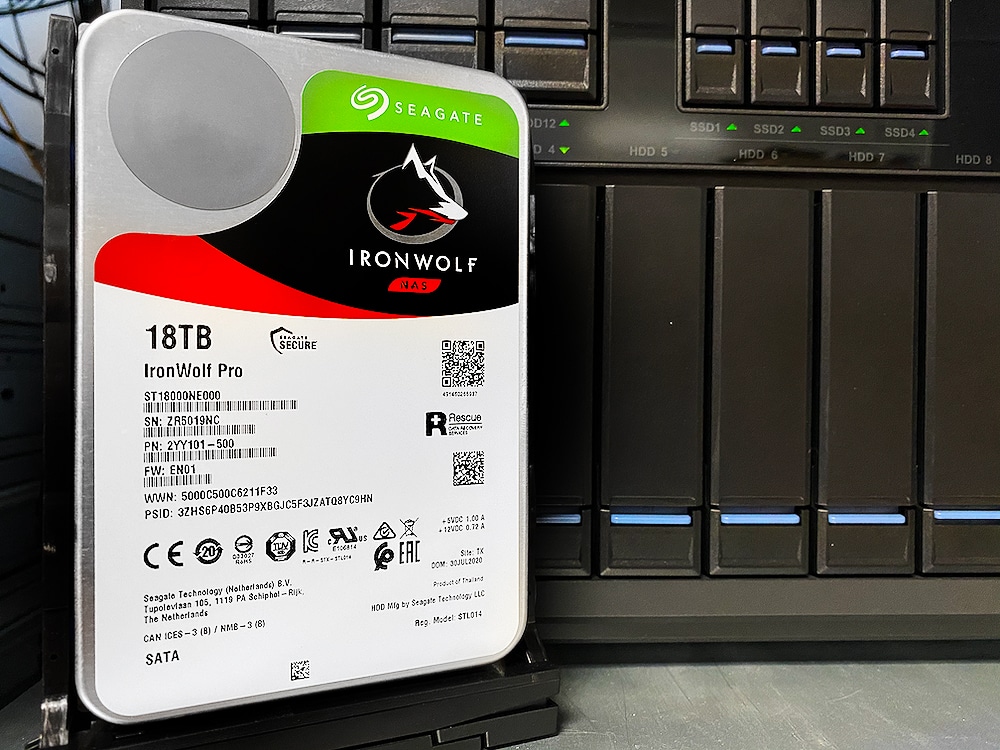The Seagate IronWolf Pro 18TB is the company’s highest capacity NAS drive designed for always-on, always accessible 24×7 usage, marking an impressive 2TB gain from last year’s model (which significantly increases a user’s net capacity in larger NAS solutions). With this massive capacity point and focus on reliability and endurance, the company’s new 18TB drive is ideal for SMBs that need durable storage for their heavy workloads as well as for use cases like large-scale, multi-user commercial NAS environments. In addition, this large capacity point allows the IronWolf to scale as these data requirements grow, meaning more choice for organizations without greatly affecting budgets.
The Seagate IronWolf Pro 18TB is the company’s highest capacity NAS drive designed for always-on, always accessible 24×7 usage, marking an impressive 2TB gain from last year’s model (which significantly increases a user’s net capacity in larger NAS solutions). With this massive capacity point and focus on reliability and endurance, the company’s new 18TB drive is ideal for SMBs that need durable storage for their heavy workloads as well as for use cases like large-scale, multi-user commercial NAS environments. In addition, this large capacity point allows the IronWolf to scale as these data requirements grow, meaning more choice for organizations without greatly affecting budgets. 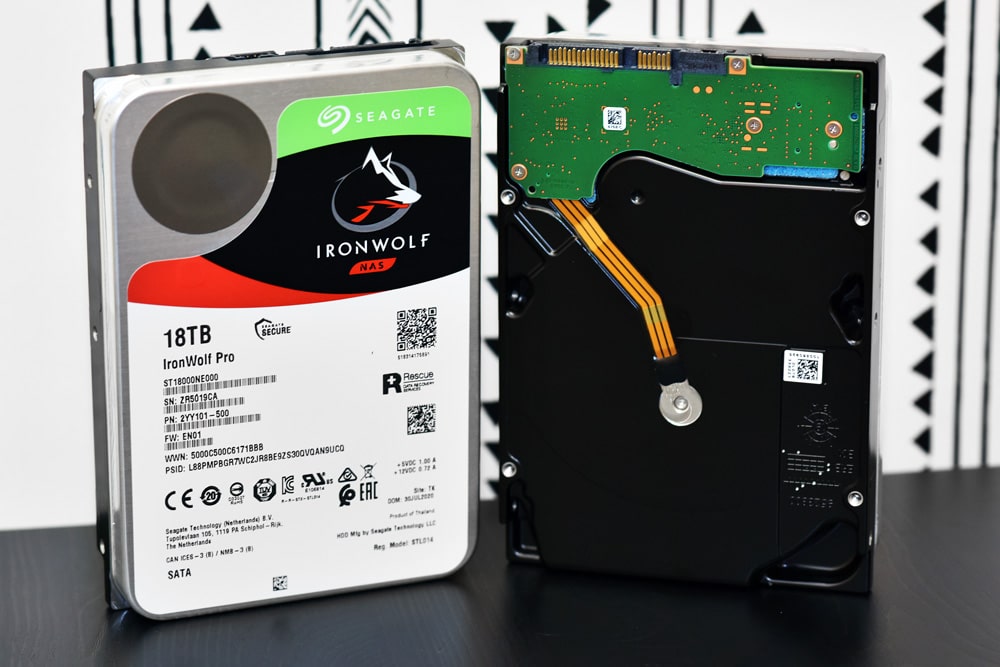
This drive features Conventional Magnetic Recording (CMR) and AgileArray, which promotes higher NAS RAID performance and IOPS with Time-Limited Error Recovery. AgileArray (a set of hardware, firmware, and software) allows for a wide range of useful features that improve performance, reliability, and power management. This includes Error Recovery Control to eliminate RAID drop off and increase data retry speeds and high durability for 24×7 workloads up to 300TB per year. The IronWolf Pro 18TB also features vibration protection under AgileArray, which improves tolerance for multi-bay configurations, and dual-plane balance which helps decrease overall movement of the drive and quiet operation.
Like all drives of this class, it features IronWolf Health Management (IHM). This embedded software application focuses on data prevention, intervention, and recovery. The built-in algorithms analyze several critical drive health parameters, then determines their trends. If it finds a possible preventative and intervention action, IHM notifies users before a failure event occurs to help lessen the chance of serious failures and their associative data loss. IHM then sends the failure mode via output code to Seagate Customer Care, which will then interpret how to deal with it.
In addition to its 5-year warranty, the new IronWolf 18TB also comes bundled with Seagate’s leading data recovery service, which is free for 3 years. Claiming a 95% success rate, the rescue plan recovers lost data due to unexpected or accidental data corruption or drive damage in 15 days or less.
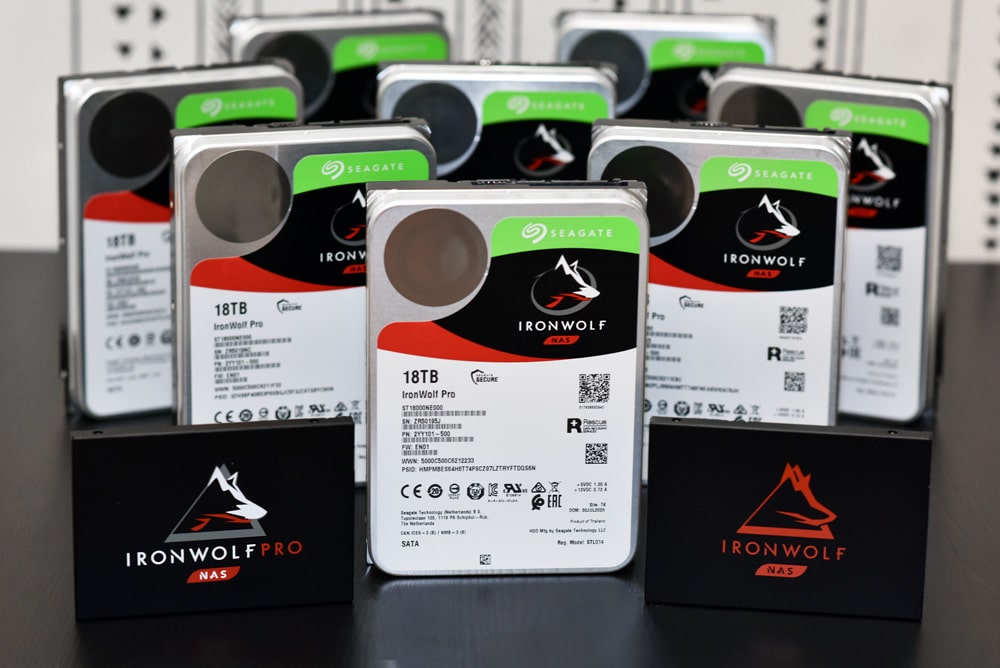
Seagate IronWolf Pro 18TB NAS HDD Specifications
| Capacity | 18TB |
| Standard Model Number1 | ST18000NE000 |
| Interface | SATA 6Gb/s |
| Features | |
| Drive Bays Supported | Up to 24-bay |
| Recording Technology | CMR |
| Workload Rate Limit (TB/yr) | 300 |
| Rotational Vibration (RV) Sensors | Yes |
| Hot-Plug Support2 | Yes |
| Cache (MB) | 256 |
| Reliability | |
| Mean Time Between Failures (MTBF, hours) | 1.2M |
| Reliability Rating @ Full 24×7 Operation (AFR) | 0.73% |
| Non-recoverable Read Errors per Bits Read, Max | 1 per 10E15 |
| Power-On Hours (per year) | 8760 |
| Sector Size (Bytes per Logical Sector) | 512E |
| Rescue Services3 | Yes |
| Limited Warranty (years) | 5 |
| Performance | |
| Spindle Speed (RPM) | 7200 |
| Interface Access Speed (Gb/s) | 6.0, 3.0, 1.5 |
| Max Sustained Transfer Rate OD (MB/s) | 260 |
| Average Latency (ms) | 4.16 |
| Rotational Vibration @10-1500Hz (rad/s2) | 12.5 |
| Power Consumption | |
| Startup Current, Typical (12V, A) | 2.0 |
| Idle Power, Average (W) | 5.2 |
| Average Operating Power (W) | 8.0 |
| Standby Mode (W) | 1.25 |
| Sleep Mode (W) | 1.0 |
| Power Supply Requirements | +12V and +5V |
| Environmental | |
| Operating Temperature (reported, °C)4 | 5 to 65 |
| Non-operating Temperature (ambient, min °C) | -40 to 70 |
| Non-operating Vibration 10Hz to 500Hz (Grms) | 2.27 |
| Operating Shock 2 ms (Read/Write) (G) | 50 |
| Non-operating Shock 1 ms and 2 ms (G) | 200 |
| Idle Acoustics (typical, bels) | 2.8 |
| Seek Acoustics (typical, bels) | 3.2 |
| Physical | |
| Height (mm/in, max) | 26.11/1.028 |
| Width (mm/in, max) | 101.85/4.01 |
| Depth (mm/in, max) | 146.99/5.787 |
| Weight (g/lb, typical) | 670/1.477 |
Seagate IronWolf Pro 18TB NAS HDD Performance
In this review, we look at 8 drives in a RAID6 configuration inside our QNAP TS-1685 for testing. We use our Dell PowerEdge R730 with a Windows S2012 R2 VM as an FIO load generator.
Enterprise Synthetic Workload Analysis
Our enterprise hard drive benchmark process preconditions each drive-set into steady-state with the same workload the device will be tested with under a heavy load of 16 threads, with an outstanding queue of 16 per thread. The device is then tested in set intervals in multiple thread/queue depth profiles to show performance under light and heavy usage. Since hard drives reach their rated performance level very quickly, we only graph out the main sections of each test.
Preconditioning and Primary Steady-State Tests:
- Throughput (Read+Write IOPS Aggregate)
- Average Latency (Read+Write Latency Averaged Together)
- Max Latency (Peak Read or Write Latency)
- Latency Standard Deviation (Read+Write Standard Deviation Averaged Together)
Our Enterprise Synthetic Workload Analysis includes four profiles based on real-world tasks. These profiles have been developed to make it easier to compare to our past benchmarks, as well as widely-published values such as max 4K read and write speed and 8K 70/30, which is commonly used for enterprise drives.
- 4K
- 100% Read or 100% Write
- 100% 4K
- 8K 70/30
- 70% Read, 30% Write
- 100% 8K
- 128K (Sequential)
- 100% Read or 100% Write
- 100% 128K
Looking at our throughput test which measures 4K random performance, the 18TB Seagate IronWolf Pro showed iSCSI performance of 8,373 IOPS read and 1,065 IOPS write. In SMB, the 18TB Seagate IronWolf posted 9,451 IOPS read and 862 IOPS write. 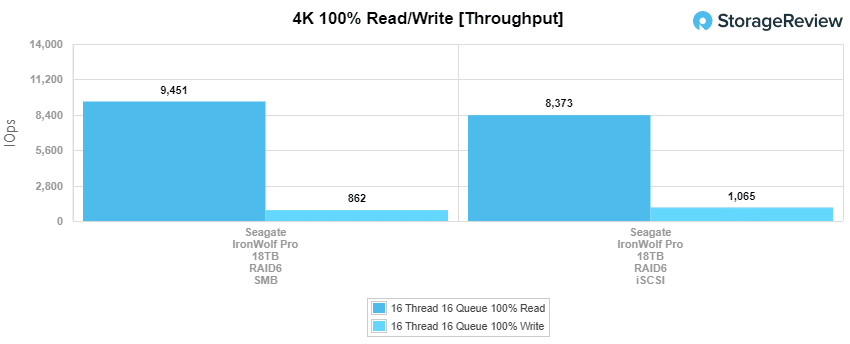 Next, we move on to 4K average latency. The 18TB Seagate IronWolf Pro drive hit 240.189ms latencies of write and 30.573ms read in the iSCSI configuration while SMB recorded 296.75ms write and 27.082ms read.
Next, we move on to 4K average latency. The 18TB Seagate IronWolf Pro drive hit 240.189ms latencies of write and 30.573ms read in the iSCSI configuration while SMB recorded 296.75ms write and 27.082ms read.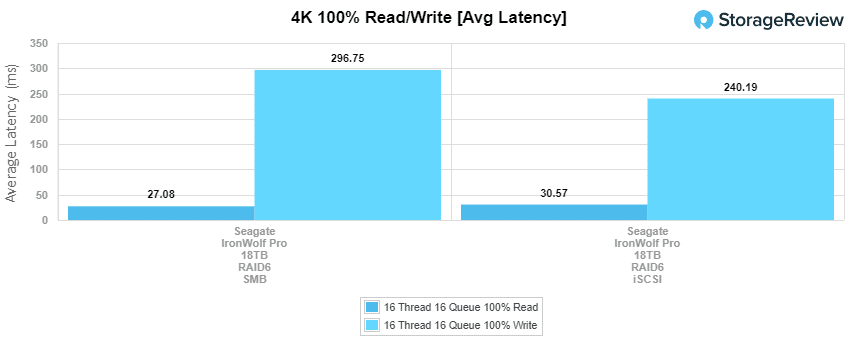
With 4K max latency, the 18TB Seagate IronWolf Pro hit 1,304.2ms read and 1,568.2ms write in iSCSI while the it showed 899.433 read and 4,746ms write in SMB.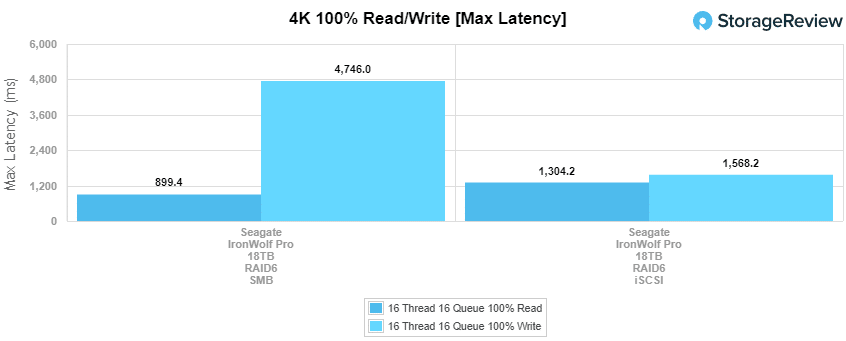
In standard deviation, the 18TB Seagate IronWolf showed reads and writes of 64.619ms and 421.349ms in iSCSI, respectively, while CIFS hit 36.173ms and 228.98ms in SMB.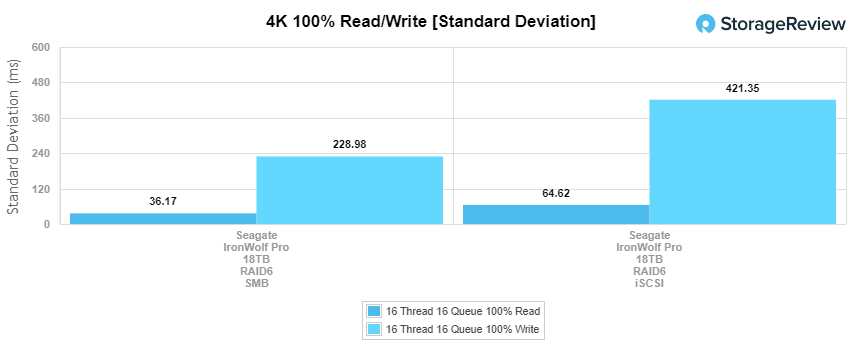
The next benchmark tests the drives under 100% read/write activity, but this time at 8K sequential throughput. In iSCSI, the 18TB Seagate IronWolf hit 223,428 IOPS read and 90,480 IOPS write, while SMB saw much slower read performance with 60,662 IOPS alongside its 42,838 IOPS write.
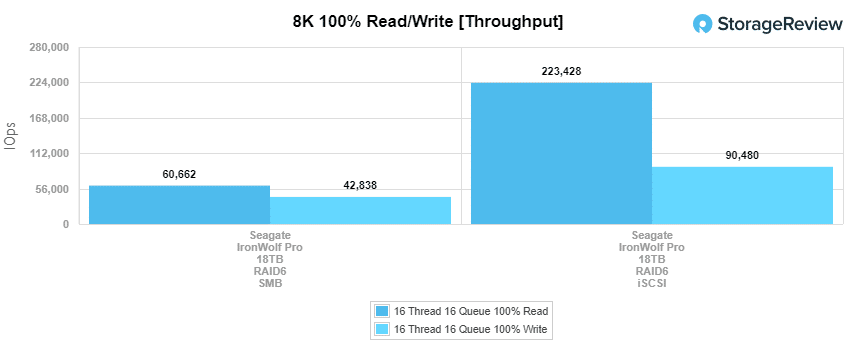
Our next test shifts focus from a pure 8K sequential 100% read/write scenario to a mixed 8K 70/30 workload, which will demonstrate how performance scales in a setting from 2T/2Q up to 16T/16Q. In SMB, the 18TB Seagate IronWolf started at 3,452 IOPS while ending at 3,016 IOPS in the terminal queue depths. In iSCSI, we saw a range of 963 IOPS to 2,150 IOPS.
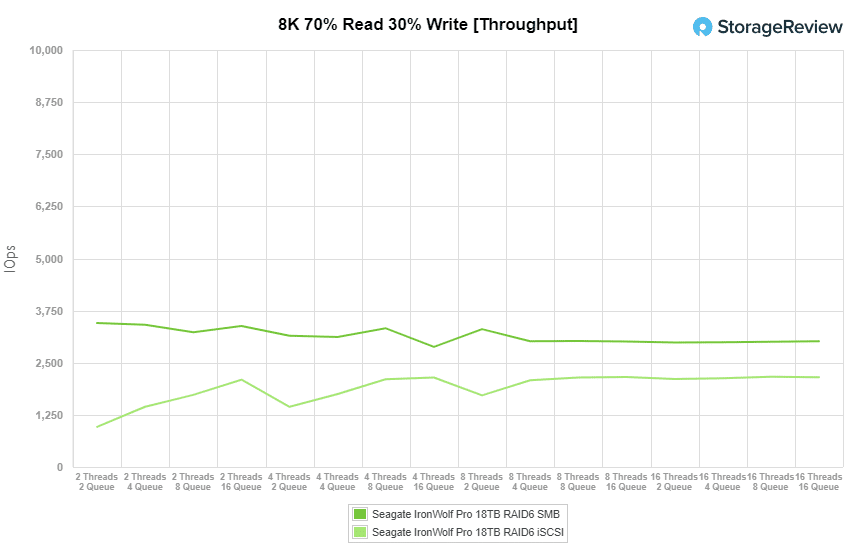 With average latency at 8K 70/30, the 18TB Seagate IronWolf showed a range of 4.14ms through 118.95ms in iSCSI, while SMB showed a range of 1.15ms through 84.81ms.
With average latency at 8K 70/30, the 18TB Seagate IronWolf showed a range of 4.14ms through 118.95ms in iSCSI, while SMB showed a range of 1.15ms through 84.81ms.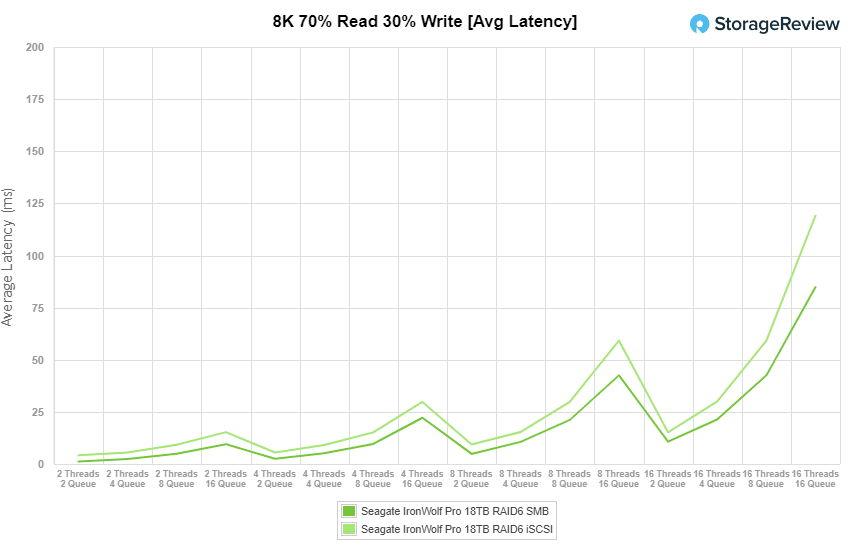
Moving on to max latency numbers, the 18TB Seagate IronWolf posted a range of 69.85ms to 875.5ms in CIFS, while iSCSI showed 267.54ms through 1,602.42ms in the terminal queue depths.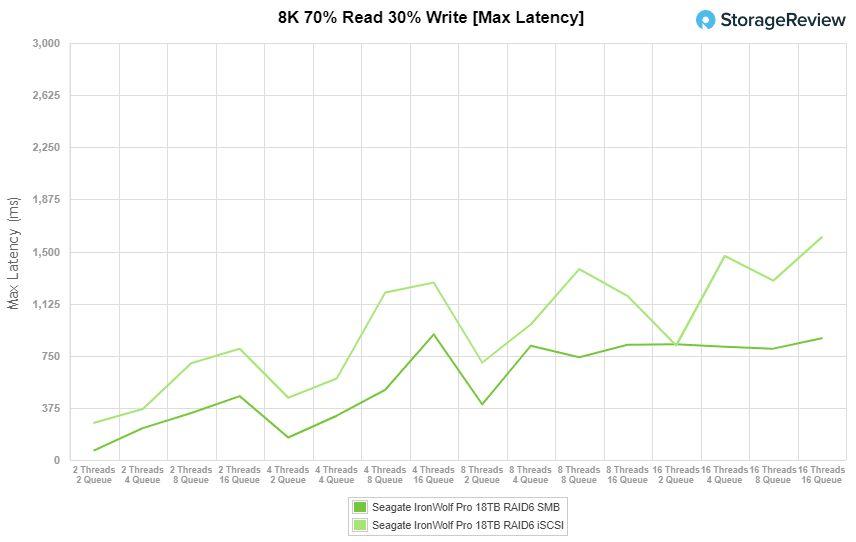
The standard deviation latency results, the 18TB Seagate IronWolf peaked showed a range of 0.98ms to 33.34ms in SMB while iSCSI recorded 10.07ms through 195.02ms.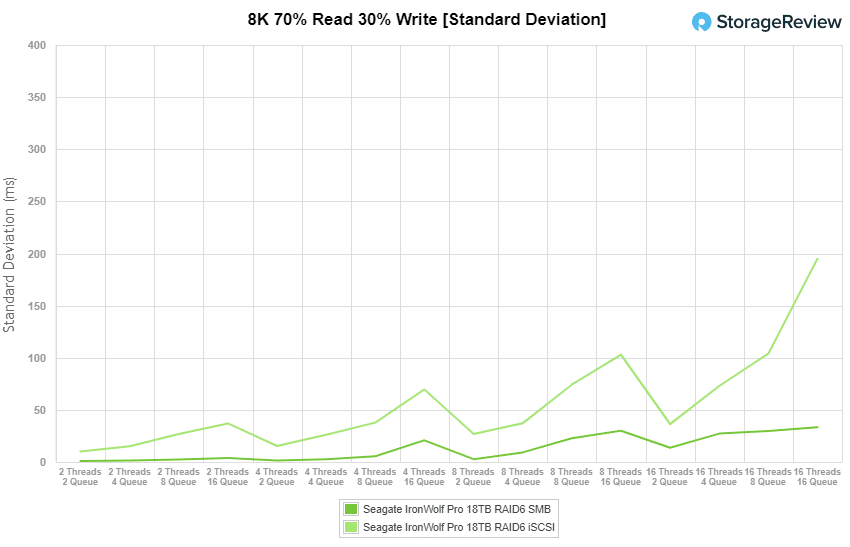
Our last test is the 128K benchmark, which is a large-block sequential test that shows the highest sequential transfer speed. Here, the 18TB Seagate IronWolf showed 2.31GB/s read and 1.33GB/s write in SMB, while iSCSI had 1.96GB/s read and 1.89GB/s write.
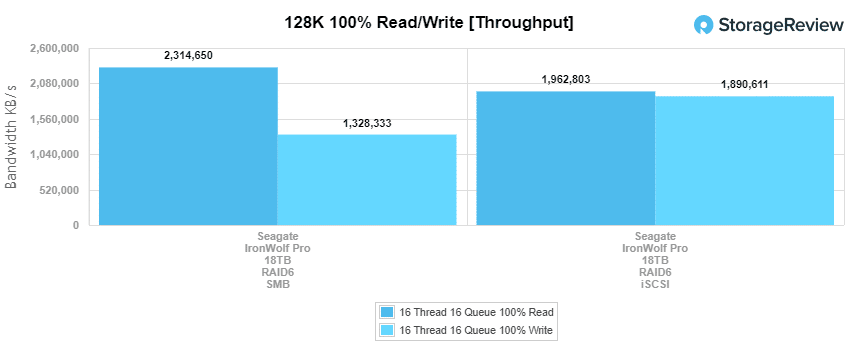
Conclusion
The new Seagate IronWolf Pro is the largest capacity HDD we’ve seen to date, and overall a solid release from the storage company. This purpose-built NAS drive gives users a ton of flexibility with its 18TB capacity point, allowing organizations to scale as their data needs grow while limiting the impact on their budgets. Moreover, results from our performance tests only confirm that this line is a great option for SMBs, large-scale, multi-user commercial NAS environments, and multi-media/creative professional server storage use cases.
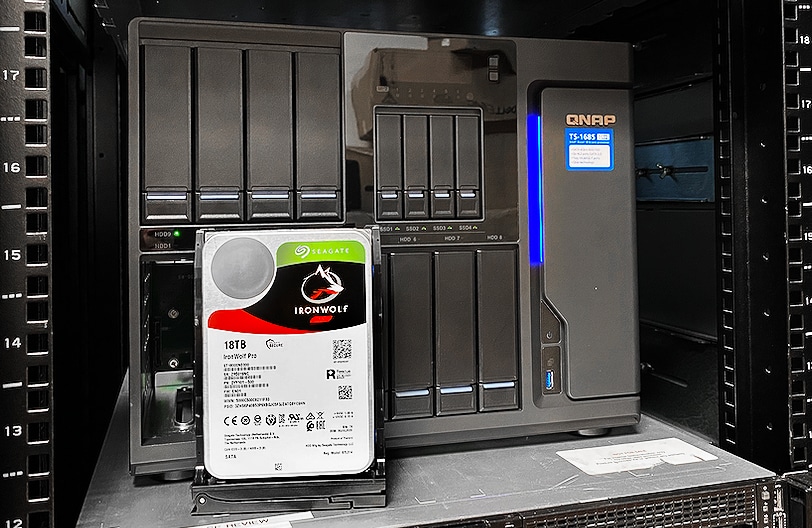
With the increase to 18TB (2TB more than the previous model), the newest IronWolf drive noticeably increases an organization’s net storage capacity, especially in larger NAS systems (up to 24 bays). In addition, the IronWolf Pro 18TB supports the Seagate’s embedded IHM software and AgileArray, the latter which offers a range of hardware, firmware, and software features designed to improve the overall NAS experience. The drive comes with the Seagate’s 5-year limited warranty and three years of their extensive data recovery service.
As far as the details of its performance go (which we tested using both iSCSI and SMB connectivity in RAID6), the Seagate IronWolf Pro 18TB showed good performance for its particular applications. With our VDBench workloads, the Seagate drive showed 4K random performance of 8,373 IOPS read and 1,065 IOPS write (iSCSI) and 9,451 IOPS read and 862 IOPS write (SMB).
Looking at workloads under 100% read/write activity 8K sequential throughput, the 18TB Seagate IronWolf hit 223,428 IOPS read and 90,480 IOPS write in iSCSI, while SMB saw 60,662 IOPS read and 42,838 IOPS write. In our mixed 8K 70/30 workload, which will demonstrate how performance scales in a setting from 2T/2Q up to 16T/16Q, the Seagate drive started at 3,452 IOPS while ending at 3,016 IOPS in the terminal queue depths (SMB), while posting a range of 963 IOPS to 2,150 IOPS in iSCSI.
Finally, in our large-block sequential 128K benchmark, the 18TB Seagate IronWolf Pro showed 2.31GB/s read and 1.33GB/s write in SMB, while iSCSI had 1.96GB/s read and 1.89GB/s write.
Overall, the Seagate IronWolf Pro 18TB NAS HDD is a strong drive with a massive capacity point, allowing organizations to easily scale their NAS devices as their storage needs expand. Coupling this with solid performance, AgileArray, and embedded IHM software, make this a great choice for organizations that have a large, or quickly growing, data footprint.
Engage with StorageReview
Newsletter | YouTube | Podcast iTunes/Spotify | Instagram | Twitter | Facebook | RSS Feed

